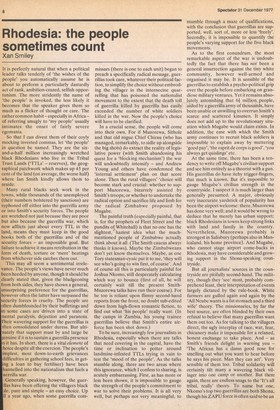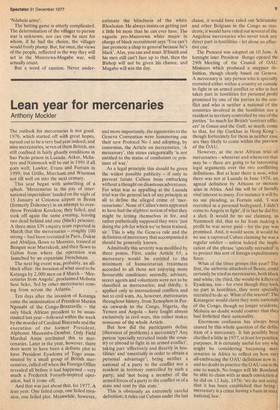Rhodesia: the people sometimes count
Xan Smiley
It is perfectly natural that when a political leader talks tenderly of 'the wishes of the people' you automatically assume he is about to perform a particularly dastardly act of rank, ambition-crazed, selfish oppor tunism. The more stridently the name of 'the people' is invoked, the less likely it becomes that the speaker gives them so much as a flicker of thought or care. The rather common habit—especially in Africa— of referring smugly to 'my people' usually intimates the onset of fairly severe egomania.
So that I can divest them of their coyly mocking inverted commas, let 'the people' in question be named. They are the six and-a-half million increasingly wretched black Rhodesians who live in the Tribal Trust Lands ('TTLs' — reserves), the geographical patchwork which makes up 45 per cent of the land (on average, the worse half) where Ian Smith kindly allows them to reside.
Many rural blacks seek work in the towns, while thousands of the unemployed (their numbers bolstered by sanctions) are syphoned off either into the guerrilla army or into Smith's security forces. The people are wretched not just because they are poor but also because the guerrilla war, which now afflicts just about every TTL in the land, means they must keep in the good books both of the guerrillas and of the security forces — an impossible goal. But failure to achieve it means retribution in the form of death, torture or 'mere' beatings from whichever side catches them out.
This may all seem a sentimental irrelevance. The people's views have never much been heeded by anyone, though it should be clearly stated that, given the bludgeoning from both sides, they have shown a general, unsurprising preference for the guerrillas, however often the latter have surpassed the security forces in cruelty. The people are often dumbfounded by their buffetings and in some cases are driven into a state of mental paralysis, dejection and paranoia.
Their wavering support for the guerrillas is pften consolidated under duress. But ultiriately that support must by and large be 4enuine if it is to sustain a guerrilla presence is it has. In short, there is a vital element of :hoice despite all the coercion. The people's implest, most down-to-earth grievances• difficulties in gathering school fees, in geting a loan to buy fertiliser) have been hannelled into the nationalism that fuels a ucrrilla war.
Generally speaking, however, the guer'Has have been offering the villagers black de, pure and simple — an easy choice. Up II a year ago, when some guerrilla com missars (there is one to each unit) began to preach a specifically radical message, guerrillas took care, whatever their political faction, to simplify the choice without embroiling the villager in the internecine quarrelling that has poisoned the nationalist movement to the extent that the death toll of guerrilla killed by guerrilla has easily exceeded the number of white soldiers killed in the war. Now the people's choice will have to be clarified.
In a crucial sense, the people will come into their own. For if Muzorewa, Sithole and that old rogue Chief Chirau (who has managed, remarkably, to sidle up alongside the big shots) do extract the reality of legislative power (with Smith abandoning his quest for a 'blocking mechanism') the war will undoubtedly intensify — and Andrew Young and others have condemned the 'internal settlement' plan on that score alone. Then the rural villagers' choice will become stark and crucial: whether to support Muzorewa, bizarrely assisted by Smith's troops; or whether to undertake the radical option and sacrifice life and limb for the radical Zimbabwe proposed by Mugabe.
The painful truth (especially painful, that is, for the prophets of Fleet Street and the pundits of Whitehall) is that no one has the slightest, I haziest idea what the much. mentioned people of Zimbabwe actually think about it all, (The Smith caucus always thinks it knows). Maybe the Zimbabweans don't yet know themselves. Maybe, as one Tory statesman-cynic put it to me, 'they will see who's going to win first, of course'. And of course all this is particularly painful for Joshua Nkomo, still desperately calculating which way to bounce (first of all, he will certainly wait till the present SmithMuzorewa talks have run their course). For he too is reliant upon flimsy second-hand reports from the front, no doubt sub-edited down from high-flown romantic fiction, to find out what 'his people' really want. (In the camps in Zambia, his young trainee guerrillas believe that Smith's entire airforce has been shot down.) To be sure, increasingly few journalists in Rhodesia, especially when there are talks that need covering in the capital, have the time or inclination to potter around landmine-infested TTLs trying in vain to test the 'mood of the people'. As the talks stumble along, there are two areas where this ignorance, which I confess to sharing, is acutely embarrassing. First, as has more or less been shown, it is impossible to gauge the strength of the people's commitment to war to solve their problems. It is all very well, but perhaps not very meaningful, to mumble through a maze of qualifications, with the conclusion that guerrillas are supported, well, sort of, more or less 'freely'. Secondly, it is impossible to quantify the people's varying support for the five black movements.
As to the first conundrum, the most remarkable aspect of the war is undoubtedly the fact that there has not been a general insurrection against the tiny white community, however well-armed and organised it may be. It is sensible of the guerrillas to establish a psycho-political grip over the people before embarking on grandiose military ventures. Yet it remains absolutely astonishing that 6i million people, aided by a guerrilla army of thousands, have been unable or unwilling to overrun Smith's scarce and scattered kinsmen. It simply does not add up to the revolutionary situation which Mugabe would claim exists. In addition, the ease with which the Smith army continues to recruit black soldiers is impossible to explain away by muttering 'good pay', 'the esprit de corps is good', 'you always get quislings' etc.
At the same time, there has been a tendency to write off Mugabe's civilian support and see him entirely as a theorist with a gun. His guerrillas do have itchy trigger-fingers, that much is known. But it's impossible to gauge Mugabe's civilian strength in the countryside. I suspect it is much larger than generally presumed. A major, obviously very inaccurate yardstick of popularity has been the airport welcome: there, Muzorewa has done very well; and it would be wrong to deduce that he merely has urban support: black Rhodesians in towns keep strong links with land and family in the country. Nevertheless, Muzorewa probably is strongest in Salisbury (perhaps also in Manicaland, his home province). And Mugabe, who cannot stage airport come-backs in Rhodesia, may have considerable and growing support in the Shona-speaking countryside.
But all journalists' sources in the countryside are pitifully second-hand. The military, though they 'see' most, probably comprehend least, their interpretation of eVents largely dictated by the rule-book. White farmers are gulled again and again by the 'All Ncube wants is a fat stomach and a third wife' theory. The missionaries, by far the best source, are often blinded by their own refusal to believe that many guerrillas want them out too. As for talking to the villagers direct, the ugly interplay of race, war, fear, chicanery make it impossible for a relaxed, honest exchange to take place. And — as Smith's friends delight in warning you — "The African has a damn good nose for smelling out what you want to hear before he says his piece. Man they can act'. Very sensible of them too. Tribal solidarity will certainly tilt many a wavering black villager into one camp or another. But there again, there are endless snags to the 'It's all tribal, really' theory. To name but one, Nkomo's top two guerrillas are both Shona, though his ZAPU force is often said to be an `Ndebele army'.
The betting game is utterly complicated. The determination of the villager to pursue war is unknown, nor can one be sure for whom, if he had the choice, the villager would freely plump. But, for once, the views of the people, reflected in the way they will act in the Muzorewa-Mugabe war, will actually count.
But a word of caution. Never under estimate the blindness of the white Rhodesian. He always insists on getting just a little bit more than he can ever have. The vaguele pro-Muzorewa white major in charge of black recruitment says 'You can't just promote a chap to general because he's black'. Alas, you can and must. If Smith and his men still can't face up to that, then the Bishop will not be given his chance, and Mugabe will win the day.







































 Previous page
Previous page